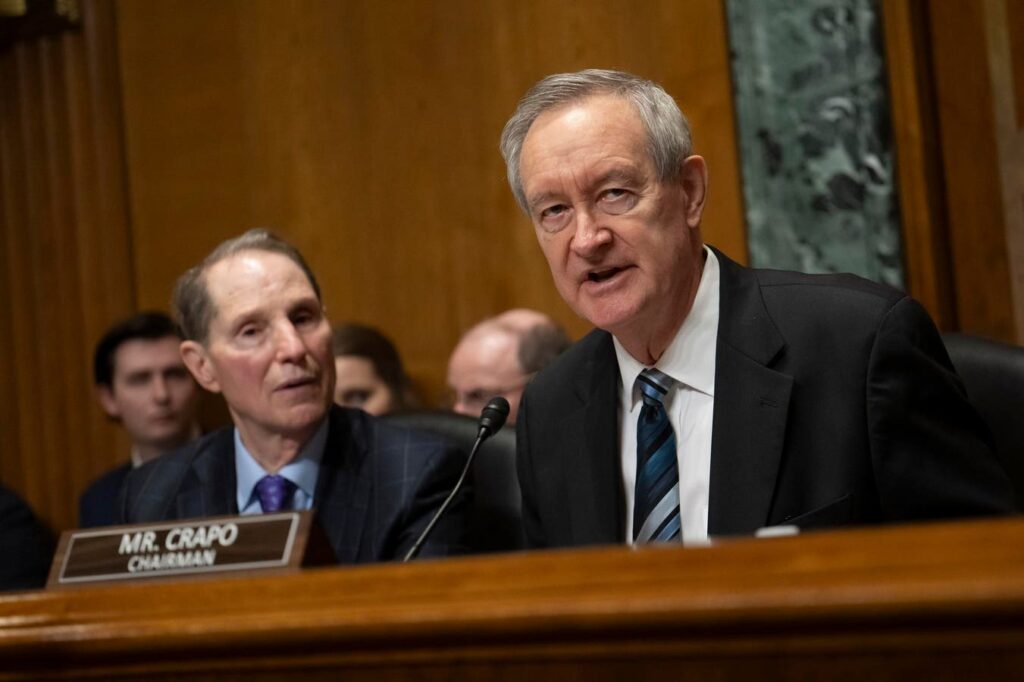WASHINGTON, DC – MARCH 14: Senate Finance Committee Chairman Mike Crapo (R-ID) is seen before Dr. … More
The Washington Post via Getty ImagesThe Senate’s draft budget bill would cut Medicaid for older adults and people with disabilities even more deeply than the House version. It would scrap a Biden-era minimum staffing rule for nursing homes. And, at the same time, it drops a House proposal to increase tax-free savings that higher-income households could use to buy long-term care insurance or pay caregiving costs.
The overall measure, approved by the Senate Finance Committee and likely to reach the Senate floor sometime next week, would cut taxes by trillions of dollars over the next decade and cut spending, though by significantly less. The Congressional Budget Office has not yet calculated the costs of the package. It also is possible Senate GOP leaders will revise the bill before it reaches the Senate floor.
However, the current version would make substantial changes to programs affecting older adults, especially those on Medicaid. While Medicaid is widely considered to be a program for poor families, more than half of its benefits go to older adults and younger people with disabilities. About 7.2 million seniors and 4.8 million younger people with disabilities are enrolled in both Medicaid and Medicare.
Medicaid Provider Taxes
The Senate bill mimics the House measure by limiting the ability of states to tax Medicaid providers, such as hospitals and nursing homes, but it is even more aggressive. Those complex provider taxes make it possible for states to pay providers more and effectively bill most of the additional costs to the federal government, which pays for about 70 percent of the program on average.
The House bill would cap these taxes at current levels. The Senate plan would require states to lower their taxes for most providers, though they still could tax nursing homes at the higher levels. The provider tax limits would apply only to the 40 states and the District of Columbia that expanded Medicaid under the Affordable Care Act.
Critics call provider taxes a financial gimmick that allows states to boost federal payments for the program. However, the real-world impact would be less federal funding for state Medicaid programs. And that would force states to either cut Medicaid benefits, limit program eligibility, or raise taxes to fill the federal hole.
It also likely would result in states scaling back their home and community-based benefits, which are optional under the law, and shift more people to nursing home care, which is required.
Work Requirements
Like the House version, the Senate bill also would require Medicaid recipients to work. It exempts older adults and people with disabilities from having to work. But it could require some family members who are unable to work because of their caregiving responsibilities to choose between assisting a loved one and losing their own Medicaid benefits.
The House bill appears to exempt family members caring for children and younger people with disabilities, but it is not clear whether it protects those staying home to assist frail parents or spouses.
The Senate bill is ambiguous in a different way. It would exempt people from the Medicaid work requirement if they are a “parent, guardian, caretaker relative, or family care
giver (as defined in section 2 of the RAISE Family Caregivers Act) of a dependent child 14 years of age and under or a disabled individual.”
And what does the RAISE Act say? “The term “family caregiver” means an adult family member or other individual who has a significant relationship with, and who provides a broad range of assistance to, an individual with a chronic or other health condition, disability, or functional limitation.”
What does that mean? Well, nobody really knows. What does “significant relationship” mean? What is a “broad range of assistance?” What happens if two Medicaid recipients are caring for a parent? Which is exempt from the work requirement?
Presumably, somebody at the Department of Health and Human Services eventually would have to write regulations to clarify it all. But that could take months, at the very least, especially since the Trump Administration fired so many HHS staffers earlier this year.
More Paperwork
The Senate bill also adopts many of the House’s additional paperwork requirements for those applying for Medicaid or trying to keep benefits.
It would block a Biden Administration rule that makes it easier to enroll in Medicare Savings Programs, which allow Medicaid to cover Medicare premiums and cost sharing. Without MSPs, low-income Medicare beneficiaries would have to pick up those costs themselves or buy costly Medicare Supplement (Medigap) insurance.
The Senate bill also would effectively scrap Biden rules that would require nursing homes to maintain a minimum level of staff, including aides and Registered Nurses. Nursing homes are fighting those rules in court but a congressional repeal of the regulations would make the legal battle unnecessary.
Finally, the Senate bill excludes a change in the House bill that could benefit higher-income people who want to put money away for long-term care. The House version would double the maximum contributions to employer-based Health Savings Accounts, but the Senate measure currently has no provision.
The House and Senate are operating on a self-imposed July 4 deadline for passing this huge fiscal bill. It will be important to keep an eye on what happens over the next couple of weeks.
Read the full article here


